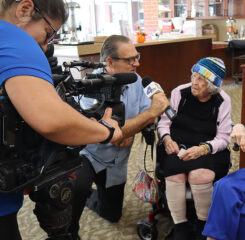COVID-19 and Affordable Housing Providers: Recap of Key HUD Guidance
As the health emergency continues, affordable senior housing providers have questions about how best to serve residents and continue operations. Keeping in mind that COVID-19 guidance is updated frequented by HUD, here is a summary of existing federal guidance available in response to common questions from mid-April:
-
Can I delay annual recertifications?
Across the country, annual income recertification (AR) completion rates have dropped. Site staff are swamped with other urgent tasks resulting from the crisis, and many organizations have purposefully delayed ARs to limit in-person interactions at the property. What has HUD said about delays to the recertifications?
The short answer – Yes, you can delay the annual recertification completion. In early April, HUD’s Office of Multifamily Housing issued clarification for delaying ARs for 90 days. HUD also issued codes for TRACS to document reasons for delays, including a medical code for a resident who is in a quarantine, and an extenuating circumstance code for residents who are practicing social distancing. The AR adjustments are effective retroactively to the anniversary date.
The long answer – Consider timing: A 90-day delay may not be long enough to keep subsidy flowing, depending on when the anniversary date is; also, accounts overall need to keep at least 90% active status in TRACS. In addition, HUD has said specifically that providers cannot use previous information to complete a “provisional” AR and amend it later, meaning that providers should continue to complete them when safely possible. In particular, staff can make use of the streamlining and electronic options HUD issued in mid-April (temporary electronic signatures and documents acceptance, tenant “self-certification” of income changes).
Other Considerations – A final consideration for this question is that your property procedures for conducting income recertifications should not be delayed overall; while annual recertifications can be temporarily postponed, HUD is asking providers to expedite interim income recertifications as much as possible to trigger the lower tenant rent contributions and higher property subsidy flow.
HUD Guidance – To read HUD’s guidance on both annual and interim recertifications, view HUD’s April 16th Multifamily Housing FAQs, and view question #8.
-
Can I restrict visitors? Does HUD have guidance on this?
As the crisis continues, providers are maintaining or adjusting visitation restrictions to keep residents and staff healthy. What has HUD said about restricting visitors?
The short answer – Yes. Senior housing communities can set their own visitation policies and can limit building access for health and safety reasons. HUD said early in the health crisis that they do not intend to issue visitation guidance, but instead leave this decision up to individual properties. Providers also need to be mindful of fair housing and civil rights when setting community-wide policies, and make sure that limitations are implemented consistently.
The long answer – Because housing communities are porous – meaning there is significant traffic in and out of the building from residents, family members, service providers – many providers have established “Limited Access Policies” and need to consider who should be deemed “essential.” For example, for many older adults, family or community members may serve as care providers, and any visitation restriction should allow for essential care provision. For any new policy, communication is key and will help residents – and their families and support networks – comply.
Other Considerations – With limited on-site staff (especially during the crisis) or funds to hire security personnel, communities have logistical considerations when implementing access restrictions. For example, property visitation limits with have to contend with spread out campuses, multiple entrances, or limited staff capacity to screen each visitor (including after hours and on weekends). In addition, visitor restrictions should align with any local and state requirements and track with CDC health directives.
Federal Guidance – To read HUD’s guidance on visitation, view HUD’s April 16th Multifamily Housing FAQs, and view question #28. You can also view the CDC’s guidance for independent living and retirement homes.
-
I’ve stopped moving most new residents in. How will HUD handle vacancies?
Vacancies have been a hot topic among housing providers since the beginning of the health crisis. Out of concern for current residents and staff, some providers have halted most move-ins during this critical time. What is HUD’s position on vacancies resulting from COVID-19, and will they pay for them?
The short answer – HUD is encouraging owners to continue turning-over units when safely possible. There is not yet a clear answer about how HUD will handle vacancy claims; in the meantime, document everything to continue with vacancy claims.
The long answer – HUD has allowed streamlining and electronic options for site staff to continue screening and processing move-ins with limited face-to-face contact. If there is a clear reason why the unit can’t be made fit for occupancy (like a utility service that can’t be turned on), the owner should delay the move-in. In addition, HUD’s current guidance states that if a unit cannot be filled because of state or local restrictions or guidance, then the owner should submit the documentation to their HUD counterpart, and these will be reviewed on a case-by-case basis by the agency.
Other Considerations – Halting, limiting, or resuming move-ins during an infectious disease outbreak requires a lot of consideration. Some providers have implemented a move-in policy that subjects each new person or vendor entering the building (think moving personnel) to their limited access screening questionnaire; others have paused many move-ins except where there is a dire need on behalf of the new resident, such as a VAWA-candidate. There are also scenarios where the new resident is not comfortable moving in and wants to delay without losing their new apartment.
LeadingAge Position – LeadingAge believes that each provider knows best what its community needs. In order for owners to stay solvent and extend vacancies when necessary, we have asked HUD to financially incentivize owners to prioritize the health of older adults and staff by expanding and extending their vacancy claims process.
HUD Guidance – To read HUD’s guidance on move-ins and vacancies, view HUD’s April 16th Multifamily Housing FAQs, and view questions #10-14.
-
Can I apply for the new Small Business Administration (SBA) loans?
The short and long answer – Yes, some housing providers have applied for – and received – SBA loan funds in response to COVID-19. How this interacts with HUD’s secondary financing requirements, and how this tracks with HUD payroll allocations, remains an unknown. We expect more guidance from the agency on this soon.

Most Recommended
November 08, 2024
 HOTMA: New Rules for Housing
HOTMA: New Rules for Housing
November 06, 2024
 Colleagues on the Move, November 6, 2024
Colleagues on the Move, November 6, 2024
November 06, 2024
 Analysis: What Does the Final CY2025 Home Health Rule Include?
Analysis: What Does the Final CY2025 Home Health Rule Include?
October 29, 2024
Katie Smith Sloan Urges Members to Build a Movement, Take Action
Recently Added
December 10, 2024
4 Top Tech Themes from 2024
December 09, 2024
 Analysis: What’s Changing with the Home Health CAHPS Survey?
Analysis: What’s Changing with the Home Health CAHPS Survey?
December 09, 2024



